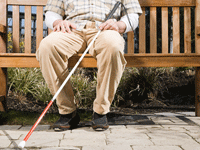
Deafblind people risk being failed by the government’s overhaul of disability living allowance after service users found a trial of the assessment process “stressful” and “inconsistent”.
A number of shortcomings were revealed in pilot face-to-face assessments for personal independence payment, which is due to replace DLA in 2013, found a report by deafblind charity Sense published today.
Deafblind people who volunteered for the trials said information such as welcome packs and feedback forms were sometimes provided in inaccessible formats, despite assessors being informed of participants’ communication preferences beforehand.
Several participants received the welcome pack one day before the assessment, not allowing enough time to read the information before their appointment. Where the welcome pack was not sent out in an accessible format, participants had little time to ask for support from another person to read it.
People’s experiences around communication support during the assessments were mixed. One teenager had to rely on her mother to clarify the complex jargon used by an assessor, while another participant said he had been unable to read the name badge of the assessor, leading to a potential security risk had he been on his own.
One participant was unable to have an assessment at all, as the assessor said they were unable to find the correct communication support.
However, participants said assessors understood and accounted for their communication needs once the needs had been explained. Some assessors even took a flexible approach to account for these needs, asking more personalised questions that were not on the forms.
There were cases, however, where assessors placed an over-emphasis on physical capabilities. One completely deafblind man from Lancashire was asked to lift his arms as high as he could and grip the assessor’s hand as hard as possible.
The participant said he wanted to tell his assessor: “Close your eyes. Cover your ears. Now consider how you would have managed today after waking up this morning. How would you have made sure you have the right clothes on? How would you have travelled to work? How would you have gone out for lunch?”
Sense said the government needed to ensure that the PIP assessment covered mobility and communication needs, not just physical impairments and personal care.
Sue Brown, head of public policy at Sense, said: “The government is insisting that face-to-face assessments will bring consistency, yet these tests have proved inconsistent. We are keen to work with the DWP to ensure the allowance goes to the people who need it, but the process and assessors much treat deafblind people fairly.”
What do you think?Join the debate on CareSpace
Keep up to date with the latest developments in social care. Sign up to our daily and weekly emails
Related articles:


 Bournemouth, Christchurch and Poole
Bournemouth, Christchurch and Poole  Hampshire County Council
Hampshire County Council  Lincolnshire County Council
Lincolnshire County Council  Norfolk County Council
Norfolk County Council  Northamptonshire Children’s Trust
Northamptonshire Children’s Trust  South Gloucestershire Council
South Gloucestershire Council  Wiltshire Council
Wiltshire Council  Wokingham Borough Council
Wokingham Borough Council  Children and young people with SEND are ‘valued and prioritised’ in Wiltshire, find inspectors
Children and young people with SEND are ‘valued and prioritised’ in Wiltshire, find inspectors  How specialist refugee teams benefit young people and social workers
How specialist refugee teams benefit young people and social workers  Podcast: returning to social work after becoming a first-time parent
Podcast: returning to social work after becoming a first-time parent  Podcast: would you work for an inadequate-rated service?
Podcast: would you work for an inadequate-rated service?  Family help: one local authority’s experience of the model
Family help: one local authority’s experience of the model  Workforce Insights – showcasing a selection of the sector’s top recruiters
Workforce Insights – showcasing a selection of the sector’s top recruiters 

 Facebook
Facebook X
X LinkedIn
LinkedIn Instagram
Instagram
Comments are closed.